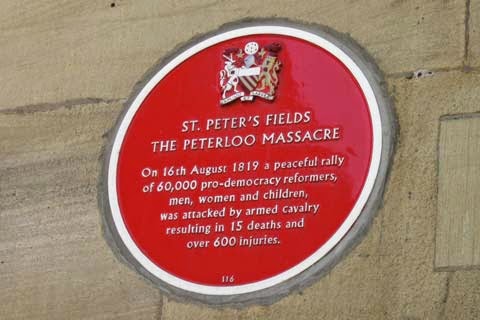
Remembering Peterloo
Share
While writing my sprawling romantic historical An Untitled Lady, I arranged to travel to Manchester, England, the week of 16 August 2010, the 190th anniversary of the big protest march I set at the heart of the story.
‘Rise like Lions after slumber
In unvanquishable number,
Shake your chains to earth like dew
Which in sleep had fallen on you-
Ye are many – they are few.’
Known to history as the Peterloo Massacre, in 1819 some 60–80,000 men, women, and even some children marched from the countryside to downtown Manchester demanding that all men gain the right the vote, not just landowners. That number of people gathered in protest looked scary to some; when the local magistrates called on their militia and nearby British troops to keep order the blades came out. At least fifteen protesters died and 400–700 were wounded; because the protest was declared illegal, many of the injured hid their wounds so the actual count is still in dispute. (The massacre, at St. Peter’s field, was nicknamed Peterloo as an ironic comparison with the battle of Waterloo, which took place four years earlier.)
During my visit, I took a Peterloo-themed tour given by Ed Glinert through New Manchester Walks. A dozen of us stood on the cement plaza and sidewalks in front of the city’s convention center, built on the land that was once St. Peter’s field. I imagined 60,000 people here, most in their Sunday best, crowded near a speaker’s stand made of two wagons lashed together. The sound must have crashed among the houses nearby, such a spectacle. How did they manage it? Even today, we rarely see crowds that size gathered in protest, and people in 1819 didn’t have cell phones, buses, or Porta-Potties.
Some historians have called Peterloo one of the defining moments of its age; because correspondents from papers like The Times were present, reports of the event—and the violence—were widely distributed, and the government could not downplay what had happened. The British people could not pretend that its army and militias were only harassing “rebels” and “miscreants” when babies and women were dead. The event also inspired Percy Bysshe Shelley to write the poem “The Masque of Anarchy,” which some have called the greatest political poem ever written in English. Its last stanza:

The political times were so sensitive, though, that while Shelley wrote the poem in less than 3 weeks in 1819, publisher Leigh Hunt did not publish it until 1832, the same year the political reforms Peterloo’s protesters sought finally became law.
But in 2010, while the food servers and shopkeepers I spoke with knew the name Peterloo, few could recall much beyond a basic idea of what happened. The only marker of the event is one of those little red circles, on the corner of the Free Trade Hall/Radisson Hotel on Peter Street. Still, the city’s Lord Mayor and Lady Mayoress did mark the anniversary with a wreath. The Peterloo Memorial Campaign has recently commissioned a larger memorial and now seeks a site to install it.
And plans are afoot for many commemorative activities marking the bicentennial of the march, in 2019.


caption: wreath in remembrance of Peterloo, 16 Aug 1819, laid on 16 Aug 2010 beneath the commemorative plaque in Manchester.
